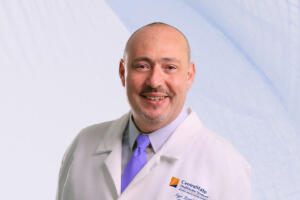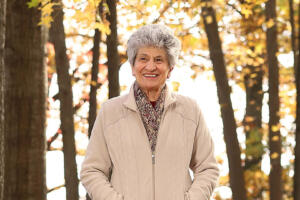For most cancer patients, learning that they had a rare genetic mutation would be an unsettling moment. For Tim Kousoulides, a 66-year-old resident of Freehold, it was welcome news that provided a new weapon to treat his aggressive cancer.
Epidermal growth factor receptor (EGFR) is a protein on the surface of cells that helps cells grow and divide. But when there is too much EGFR, cells grow too fast and can become cancerous. This specific genetic mutation is most often seen in non-smoking Asian women—and it was found in Tim, a male former smoker of Greek heritage.
A New Tool After Years of Traditional Treatment
Tim’s treatment journey began in 2017, when he started experiencing dizzy spells and low blood pressure. Board-certified hematologist-oncologist Bhavesh Balar, MD, performed a CT scan, which found two tumors in his brain and a mass on his lung. A biopsy concluded that it was stage 4 lung cancer that had spread to his brain. Board-certified neurosurgeon Mark McLaughlin, MD, removed the larger brain tumor, which sat on the speech center on the left side of Tim’s brain. Radiation therapy was used to reduce the smaller tumor on his frontal lobe. Because his lung tumor was locally advanced, he received chemotherapy and radiation at the Statesir Cancer Center at CentraState, resulting in remission.
Tests showed that the treatments worked. Then, about a year later, Tim developed bronchitis and felt a golf ball-sized lump at the base of his neck. Dr. Balar ordered genetic testing on tissue taken from an earlier biopsy, which uncovered the unique EGFR mutation. Armed with this genetic information, Dr. Balar prescribed Tagrisso, a new oral medication that’s designed to specifically target the mutation and stop cell growth.
“Cancer treatments have come a long way, and each case is unique,” says Dr. Balar. “Very few patients have mutations, but if you don’t look for them, you won’t find them.”
Throughout treatment, Dr. Balar monitored Tim’s white blood cell count and adjusted the dosage if the count dropped too low. Six weeks later, Tim could no longer feel the tumor in his neck and his cancer was in remission.
“I feel great,” says Tim, the father of two who is back to work as a driver for a solar company. “I’ll take a pill over radiation or brain surgery any day. I feel very lucky and very blessed.”
“The results of Tim’s treatment were truly remarkable,” says Tim’s wife, Louise, a retired nurse. “I cannot put into words how appreciative we are for the care he received.”
For more information about cancer services at CentraState, visit centrastate.com/personal or call 855-411-CANCER (855-411-2262).





